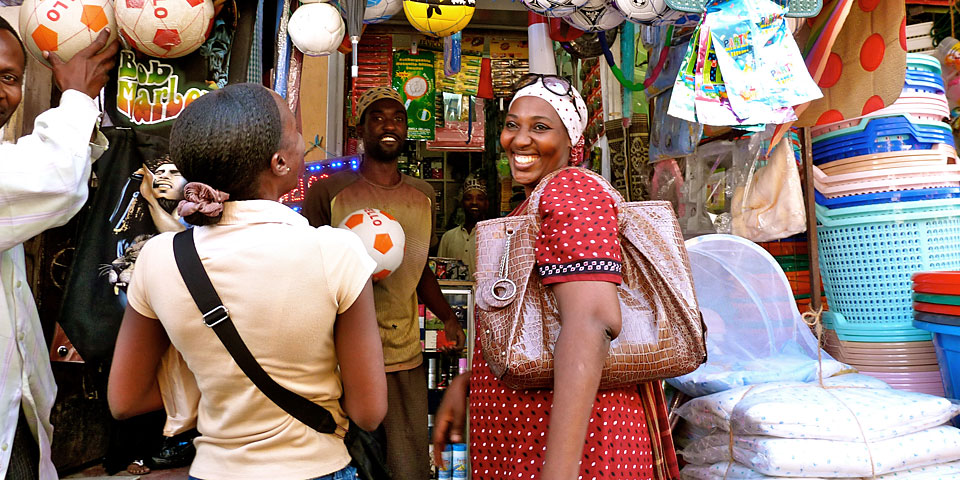
Anthropology (Master's Degree Program)
Professionalization in an international field
Anthropology asks what being and becoming human means across different social, cultural and historical contexts. It asks: How do people inhabit the global order through particular local worlds? This requires anthropologists to exercise their imagination and decenter common understandings of social relations, economic livelihoods and political power, among other things. They must thus strive to broaden the possible ways of perceiving and conceiving key challenges of our times.
Focal areas of teaching and research
The regional focus of Anthropology at the University of Basel is on Africa, Eastern Europe, Oceania and the Afro-Atlantic.
Our research and teaching focus thematically on general anthropology; the global economy; migration, mobility and belonging; gender, sexuality and kinship; medicine, health and the body; and the politics of knowledge production.
From a methodological perspective the Institute of Social Anthropology represents primarily qualitative and interpretive approaches. In particular, it nurtures the development of methods that can detect current changes under globalization.
At Master level, the students deepen their knowledge of theories and topics in Anthropology and deal with research methods. Applied ethnographic research is at the heart of the Master's program. In a two-semester project course that includes six weeks of fieldwork, students pursue their own project on a specific topic.
Language skills
Courses are taught in English. Although no certificate is required, advanced English skills (level B2 or better) are needed for successful completion of the degree.
Program structure
A master’s is a second degree that a person can earn after completing a bachelor’s. The master’s program requires a total of 120 credit points (CP). The Master's Degree Program in Anthropology is combined with a second degree subject, each worth 35 CP. The subject in which students write their master’s thesis (30 CP) is considered to be their major; the other subject is their minor. Free electives (20 CP) are also included. One ECTS credit point equates to approximately 30 hours of work.
| Master of Arts (120 CP) | ||
|---|---|---|
| Major of the Faculty of Humanities and Social Sciences 65 CP (35 CP + 30 CP for the master thesis) | Minor of the Faculty of Humanities and Social Sciences or extra-faculty 35 CP | Free electives 20 CP |
| Two degree subjects |
Combination of subjects
Students are free to select a second master’s degree subject that meets their specific interests. Students can choose a subject offered by the Faculty of Humanities and Social Sciences or a subject from another faculty. Anthropology is a particularly useful subject to combine with any discipline dealing with societies and their cultures or cultural subsections (such as art or language) or with human actions, norms (law), history, and their natural environment.
Students are free to choose any free elective. These courses allow students to deepen their knowledge of their degree subjects, gain an insight into other degree subjects offered by the University of Basel, or acquire language skills.
Career opportunities
Graduates in anthropology are characterized by a high degree of sensitivity to cultures and societies, and their ability to respond to different situations and individuals. Key qualifications arise in particular from the practice of field research, where methods such as participation, observation, recognition, understanding and communication play a crucial role. This qualifies them in particular for professional activity in development cooperation, migration and refugee assistance, NGOs (e.g. in integration work and intercultural communication), but also assignments to international organizations, e.g. as delegates or administrators of the International Committee of the Red Cross. In addition, our alumni find employment in tourism, art trade, cultural management, teaching and research, or museums. As humanities and social science graduates, further career opportunities are available to them in the areas of media, PR and marketing, fundraising or adult education.
Master’s admission requirements
Admission to master’s programs is regulated by the university student regulations and the stipulations of the individual degree program descriptions. More details of the general master’s admission requirements are provided here.
For students to be admitted with no additional requirements, they must hold a bachelor’s degree worth 180 CP from a higher education institution recognized by the University of Basel.
Subject-related requirements are defined in the admission requirements (section 3) of the study program for the relevant subject. The guidelines may also contain further useful information that is key to successful studies.
Registration dates
Students must register for their bachelor’s or master’s degree program within a specified timeframe – even in cases of delayed registration.
Information events
The University of Basel organizes regular information events for bachelor’s and master’s programs. Details can be found on the <link de fakultaet aktuelles external-link-new-window internen link im aktuellen>events page of the Faculty of Humanities and Social Sciences.
Some subject areas also offer their own separate information or welcome events. Please consult the page for the relevant subject area for event dates and locations.
